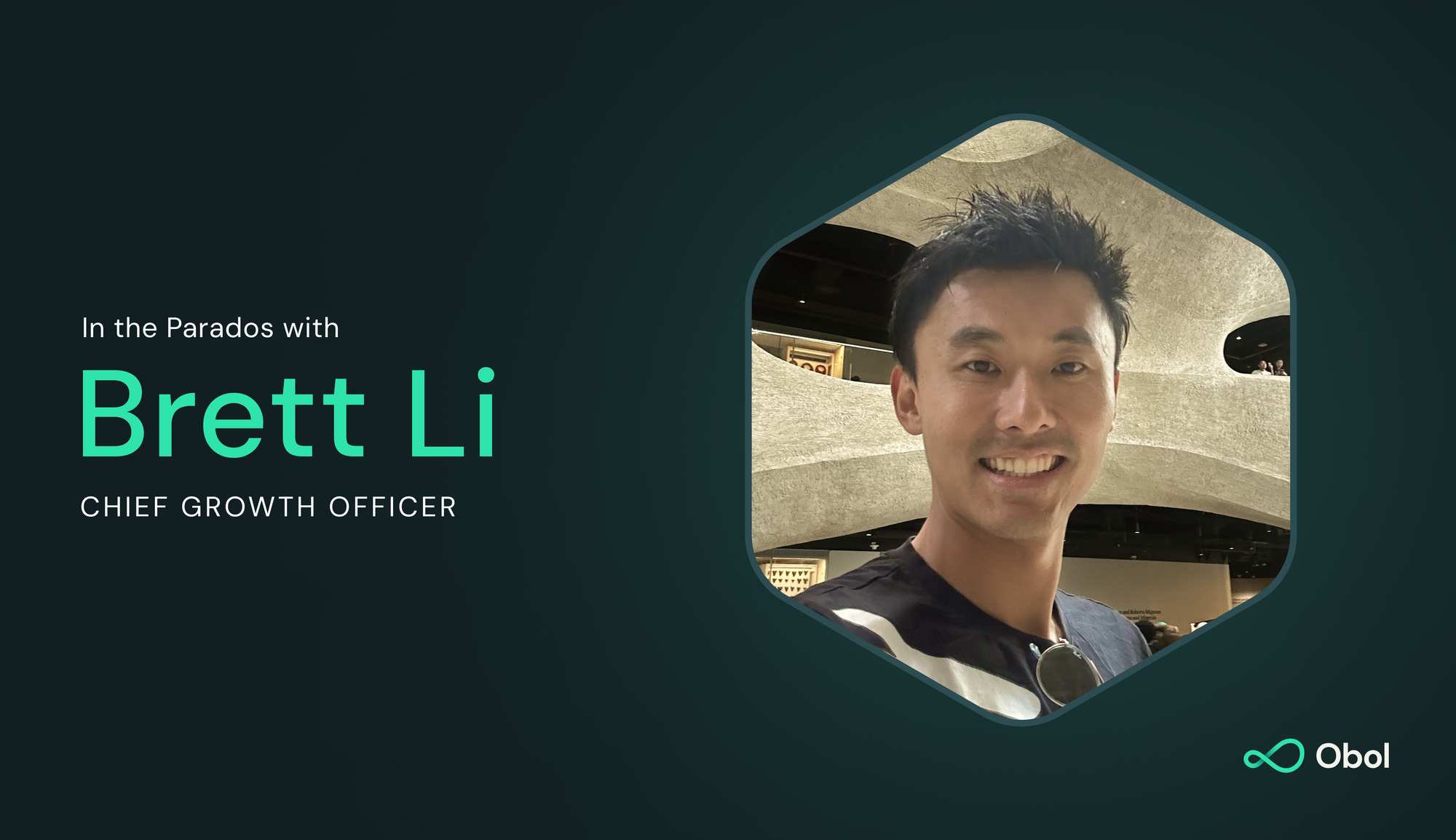In The Parodos: A Conversation With Brett Li
In a Greek theater, the parodos are the hallways where the chorus and actors enter and exit. There, actors could have conversations, getting to know one another. We want you to spend some time in the parodos with the Obol Core Team. First up, our new Chief Growth Officer, Brett Li.

Tell us a little bit about yourself. How did you end up in Web3?
I am a Web2.5 marketer. My transition from Web2 to Web3 happened gradually over the course of nearly a decade. I had heard about Bitcoin back as early as 2010, but my first true introduction to Web3 was the Ethereum whitepaper.
Although I’m now on the growth side, I studied Electrical Engineering & Computer Science at Cal, so I have a technical underpinning to everything I do. At the time I learned about Ethereum, I was a Solution Architect for a Web2 B2B company in the a16z portfolio. I came to learn about a16z’s early enthusiasm about Web3, and I got deeper on the space through their Crypto Canon (awesome to see that it’s still alive!).
Just as I believed software WAS eating the world, I believe that Web3 has an opportunity to completely change the way software could impact the world. Ethereum, being turing-complete, was the first blockchain that could actually achieve that.
After spending nearly a decade in various GTM roles in Web2, in 2018, I found my opportunity to jump into the deep-end of Web3 at Consensys. I was an early member of the product marketing circle at the Mesh working with Web3 marketing pioneers like Amanda Gutterman, Elaine Zelby, Elise Ransom, James Beck, Camilla McFarland, Everett Muzzy, Kara Miley, and others. Working with the different members of the Mesh solidified my long-term belief and unwavering passion for Web3.
With that said, I thought, in 2019, that the space was still too early to need TRUE marketers. Apart from shilling shitcoins, there weren’t many products out of the R&D phase and ready to be presented to the market. I made the decision to join a fast-growing Web2 start-up to develop as a marketing leader. After 3 years, two fundraising rounds, building a multi-functional marketing team, and growing a company from 7 to 100+, it was time to come back to Web3 for good and apply what I had learned to help push the space forward.
Ensuring the continued resiliency and decentralization of the consensus layer is a necessary step towards securing the future of PoS Ethereum.
Why Obol?
No matter what innovation happens in Web3 in terms of use cases, nothing matters without a credibly-neutral, trust-minimized, and decentralized foundation. The move from PoW to PoS in Ethereum was critical to ensuring long-term viability on many fronts (i.e. reduced energy consumption, reduced centralization risks, etc.), and ensuring the continued resiliency and decentralization of the consensus layer is a necessary step towards securing the future of PoS Ethereum. That is why the wide-spread adoption of distributed validators is so critical. When I was coming back to Web3, I wanted to find a project with a mission that mattered long-term, and there is no better project for that than Obol.
Additionally, I wanted to find a mission-driven, high-performance team that was building a product for the right reasons. Collin and Oisin have been thinking about and researching PoS Ethereum since before Genesis. There are no two more qualified individuals to build distributed validators. Their passion and purpose has also translated to the rest of the Obol Core team. I’m very proud to be a part of this team and lucky to learn from these Web3 pioneers each and every day.
Growth? What’s that?
My overall objective as the CGO is to help the community maximize the value that can be gained from Obol DVs through adoption. Practically, this entails a number of things including educating the ecosystem, raising awareness of Obol, building community, and encouraging people to engage with the project, and more. We use a number of different initiatives and channels for this including engaging people through Twitter, writing educational content on our blog, building our community through Discord, meeting people at events, etc.
As you can see, the scope of growth is very wide, and it’s by no means something any one person can do alone. I’m lucky to have two incredibly talented individuals helping to administer the community and manage events. I am also looking to hire! Check out our current job listings here.
Why are you passionate about Web3?
While I became interested in Web3 due to the potential opportunities of the technology, I’m staying in the space due to its overall mission. Two of the most important systems in the world today, internet and finance, are skewed towards working for the privileged few, rather than working for the many.
With Web3, I believe we have the ability to compose our future. That’s why I’ve adopted the name “composeus”.
I recently read a book called Stolen Focus by Johann Hari. In it, Hari details the reasons why we all seem to be losing our ability to focus, or get into our “flow state” as he calls it. One big realization he has is that the large tech companies like Google, Facebook, etc. play a big role in all of us losing our ability to focus. They are incentivized to keep your attention for as long as possible in their platforms in order to get more eyeballs that generate ad revenue, their main source of income. Rather than being incentivized to provide the best experience and value for their users, these big social media companies are instead bringing overall harm to their users in the interest of revenue. The incentive models in the financial system are also controlled, and thus skewed, towards the large financial institutions.
Hari quotes Aza Raskin, the co-founder of Center for Humane Technology and of the Earth Species Project, saying “inside of Facebook’s servers, inside of Google’s servers, there is a little voodoo doll, [and it is] a model of you… they’re collecting your click trails, and your toenail clippings, and your hair droppings. They’re reassembling all that metadata…so that doll looks more and more like you.” They then use this doll to manipulate you.
When I got into tech, this is not the future that I envisioned or wanted to help build. The decentralization and credible-neutrality of Web3 has the potential to flip this incentive model completely. Web3 can allow individuals to take ownership of their data and choose when and what to share, and allow individuals to be compensated for their data. Web3 allows systems run by large, centralized institutions today to be instead run on decentralized models, like DeFi. With Web3, I believe we have the ability to compose our future. That’s why I’ve adopted the name “composeus”.
What is one thing that you’d like to change or improve about Web3?
For all that is great about Web3 and not so great about Web2, there is still a lot the Web3 world can learn from the Web2 world. Collectively there are millions of hours of research, experience, education, and experimentation that developed the approaches and best practices of Web2. When I got my MBA at Cal (while working for Consensys and other start-ups), a lot of the courses I took in marketing, finance, leadership, etc. were based on existing industries and business models. While Web3 changes a lot of the dynamics of traditional markets, the first principles from which these best practices were derived do not change.
As an industry we are in the midst of Crossing the Chasm from early adopters to early majority. We still need to understand and apply core marketing principles like market segmentation, targeting, and positioning. If more projects learned to define their north stars and communicate by Start[ing] with Why, there would be more overall traction. If more Web3 leaders understood intrinsic and extrinsic motivations and other leadership principles, we would have better functioning teams.
There is much that can be improved in Web3 by infusing knowledge and talent from Web2. There is also the additional benefit that bringing on more talent from Web2 will lead to greater general acceptance of the space. It’s time to build more on-ramps for Web2 professionals to come to Web3 by raising awareness, building educational materials, and making the way we communicate more accessible.
This is something I’m personally passionate about. If anyone has ideas on how we can do this, I'd love to connect with them!
Anything else you’d like to share?
I’m always looking to connect with other passionate people in the space. If you want to chat about Web3 growth, building onramps for Web3, whether an MBA is worth it, or anything else, please connect with me @composeus on Twitter (aka X) or Telegram!
